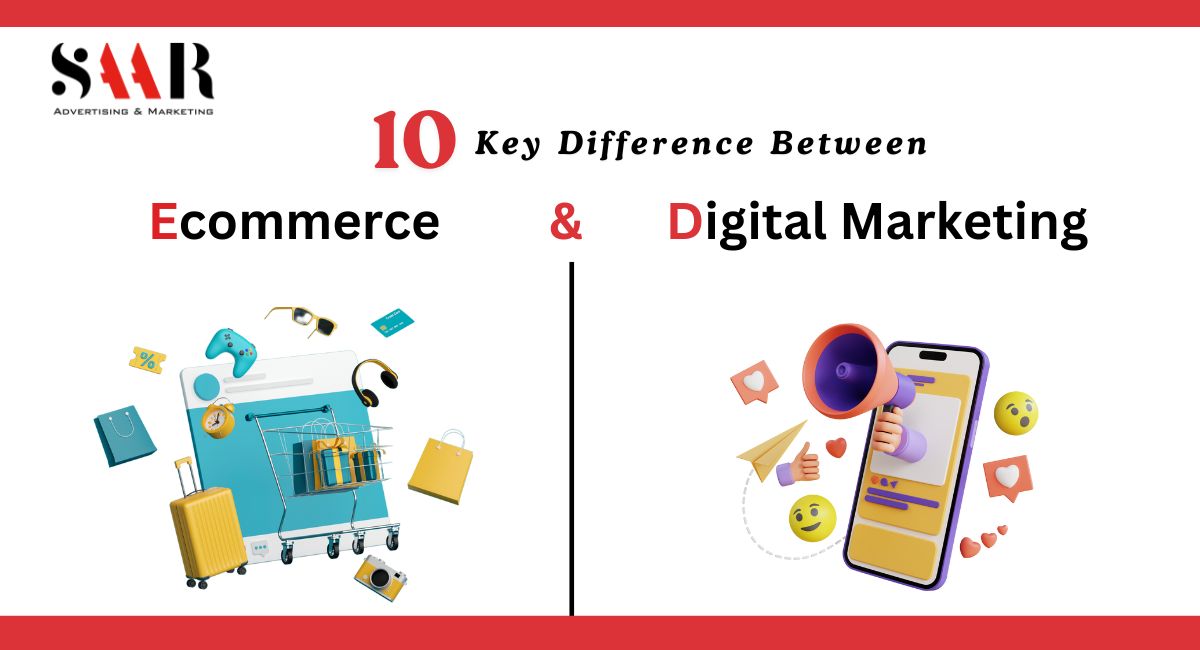
Key Differences Between E-commerce and Digital Marketing
Published on: March 19, 2025
In today’s fast-paced world, E-commerce and digital marketing are closely related, but they serve different roles. Hence, Understanding the differences between the two is very important. Let us elaborate on the difference between e-commerce and digital marketing.
Definition:
E-commerce refers to purchasing and selling products over the Internet. It includes online stores, marketplaces, and other digital platforms where these transactions occur.
Digital Marketing: This platform promotes products or services using digital channels such as social media, emails, and websites. The main idea is to reach specific customers and promote CTAs. These can be making a purchase or even visiting a website!
The difference between e-commerce and digital marketing
E-commerce: The core purpose of e-commerce is to allow transactions between buyers and sellers. The main aim is to promote an environment where the many customers can brose products, and also make many purchases.
Digital Marketing: The core purpose of digital marketing is to engage potential customers, build brand awareness, and generate sales. The main idea of digital marketing is to create demand and also guide consumers through the buying journey!
Key Components Of Both: E-commerce vs digital marketing
E-commerce components
Shopping Cart and Checkout: These systems handle order processing and payment.
Inventory Management: Managing stock levels, order fulfilment, and also logistics.
Customer Service: Handling queries.
Digital Marketing Components:
(SEO): Improving website visibility in search engine results.
Social Media Marketing: This Promotes brands and products on social media platforms.
Pay-Per-Click (PPC) Advertising: Paid ads appearing on search engines or social media.
Influencer Marketing: Collaborating with influencers to promote products.
How They Work Together?
E-commerce relies on digital marketing to attract customers to the online store. Without digital marketing, an e-commerce site might struggle to gain visibility and attract traffic.
Digital Marketing drives potential customers to e-commerce platforms. The core idea here is to build on brand awareness, which can then be converted into sales with the aid of e-commerce.
Metrics and Success Measurement
E-commerce Success Metrics:
- Sales volume
- Conversion rate
- Average order value
- Cart abandonment rate
- Customer retention and repeat purchase rate
Digital Marketing Success Metrics:
- Website Traffic
- Cost per acquisition
- Engagement rate
- Return on ad spend
- Click-through rate
Customer Interaction of Both: How e-commerce Differs from Digital Marketing
E- E-commerce: Customer interaction in e-commerce focuses on the buying experience.
Digital Marketing: Customer interaction is about engagement, building relationships, etc.
Different Skills and Responsibilities of Both
Below are the differences between e-commerce and digital marketing
E-commerce: Here, the manager aims to build the overall success of the e-commerce business.
Digital Marketing: One should know and understand the skills required for digital marketing in the fashion industry, which range from knowledge of fashion trends to performance marketing, social media management, graphic design, styling, and photography.
Scope of Digital Marketing and E-commerce
Digital marketing includes SEO, social media marketing, email marketing, content marketing, PPC, affiliate marketing and more!
E-commerce, on the other hand, is the entire process of managing an online store, which includes product listing, inventory management, shipping, and customer service!
The objective of Both Digital Marketing and E-commerce
Digital Marketing’s core objective is to attract potential customers using various digital platforms and drive conversions by engaging with them.
At E-Commerce businesses focus on converting website visitors into paying customers and processing these transactions smoothly.
Applicability of Digital Marketing and E-Commerce
We should know that digital marketing is not limited to e-commerce businesses; various industries, including services, education, entertainment, and non-profits utilize it.
E-commerce on the other hand is a business model which online retailers and marketplaces adopt.
Similarities and shared lessons between e-commerce and digital marketing
The digital marketing course and the e-commerce course have some things in common.
Both courses begin with the fashion industry module. This established module covers fashion notions like fashion product lifecycle, merchandising structure, seasons, and wholesale franchising. Both the E-Commerce and Digital Marketing teams should be aware of these notions.
Another common aspect between Digital Marketing and e-commerce is CRM. The CRM handles all business communications with customers and prospects; these include customer service emails and newsletters!
The e-commerce and digital marketing teams need to possess knowledge of Google Analytics or a similar web analytics system. They both should have a common understanding of how to measure the performance of e-commerce as every action implemented by the digital marketing team needs to reflect on the e-commerce performance KPIs
Another aspect that digital marketing and E-Commerce share is the treatment of personal data and its compliance with privacy regulations. Both E-Commerce and digital marketing teams regularly treat customers’ personal data. This may include collecting email addresses for sending newsletters, addresses for shipping, or telephone numbers for contact purposes.
Conclusion
Thus, we have outlined How e-commerce differs from digital marketing. For an advertising agency to function properly, these differences and similarities should be well known.
We at SAAR Asia are the best digital marketing agency in Dehradun. With our expertise and skilled team, we make your dreams a reality. We function by learning your company’s goals and target audience. Our core team gets ideas from diverse backgrounds to develop new strategies and aims at providing amazing experiences to our customers. Come partner with us and see your brand reach its peak.

